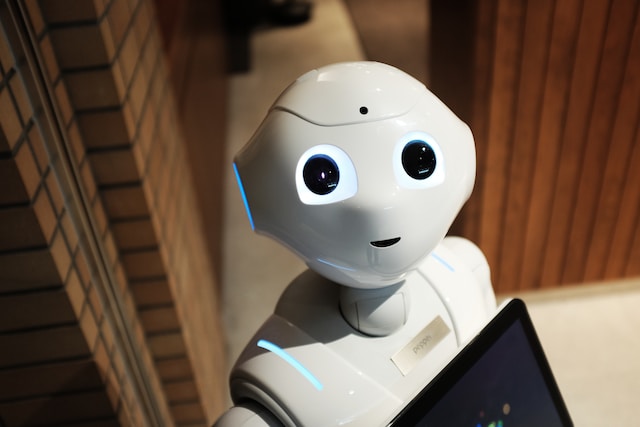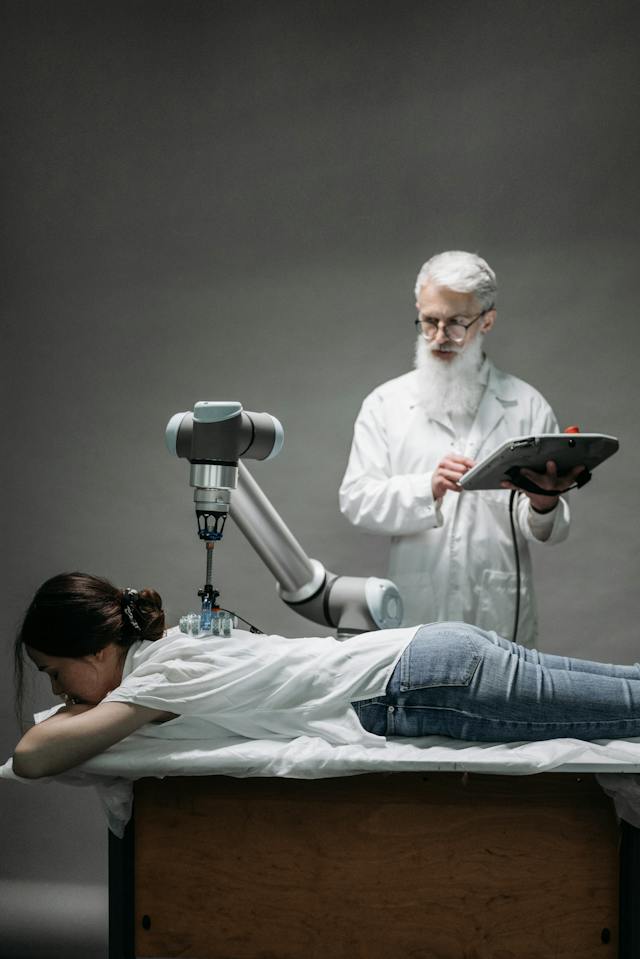Given how ably artificial intelligence (AI) can carry out many of the tasks flesh-and-blood workers are currently paid to perform, it is understandable that a growing number of them are starting to feel a little uneasy about what the future holds.
In fact, Google, which itself has started to look a bit old hat in a world of upstart AI tech, is increasingly being prompted with queries such as ‘Will AI take my job?’ and ‘What jobs will AI replace?’.
There’s even a website that will give you a likelihood of intelligent machines stealing your job in the near future.
These fears aren’t misplaced.
ChatGPT, OpenAI’s all-knowing chatbot, is a real renaissance man who can pass a bar exam, serve up medical advice, knock out marketing material and even draw up architectural plans.
Train it on your company’s proprietary data and it will know your business better than you do.
Recent research confirms what workers have suspected for some time. The International Labour Organisation (ILO), a UN body, suggests over 70 million jobs are under threat from AI automation worldwide.
While that figure represents just over 2% of the global total, the impact of generative AI on workers wiped out by the technology could be ‘brutal’, they warn, if governments don’t step in to cushion the blow.
Economists at Goldman Sachs are more pessimistic and suggest that globally up to 300 million jobs could be lost or be substantially automated by the introduction of AI to the workplace.
At the first AI safety summit in the UK, the British prime minister, Rishi Sunak, interviewed tech entrepreneur Elon Musk and the consensus of the conversation was that AI will most likely act as a copilot, helping people do their jobs better. However, Musk stated that “…there will come a point where no job is needed” as he recognises that “we will for the first time have something that is smarter than the smartest human being”.
UK Outlook for the Job Market
The UK government has carried out its own research, using analysts at the accountancy firm PwC.
“The base case estimate is that around 7% of existing UK jobs could face a high – over 70% – probability of automation over the next five years,” they say.
This rises to around 18% after ten years and just under 30% after 20 years.
The research finds that workers in call centres, sales and, in particular, customer service roles will be the hardest hit by the introduction of AI in the near to middle term.
“There are nearly 300,000 people employed in customer service occupations, where nearly three-quarters of jobs are estimated to have a high probability of displacement over the next 20 years.”
In the long term (20+ years), the research predicts, job destruction will start to bite for taxi drivers, who will be given the heave-ho once the most sophisticated type of AI, which will be able to negotiate British roads, is introduced.
For those workers who can weather the storm, the PwC paper suggests AI has the potential to boost their productivity by over 14% by 2030, which should translate to something like a 10% boost to the country’s GDP.
History Repeating?

In many ways, this is all just a little bit of history repeating.
Machines for weaving cloth, tractors, and the digital computer have all, at one time or another, threatened mass unemployment. The term ‘Luddite’ was coined to describe those who were unhappy with the first of these developments and decided to do something about it.
What’s different this time, however, is that in the past automation has gone after the low-hanging fruit, the routine tasks computer algorithms can map and automate.
Computers — and automation generally – have historically been less successful at taking on non-routine roles, tasks they find challenging not necessarily because they’re technically complicated, but because neither the worker nor the scientist seeking to automate them can pin them down and translate them into a language a machine can use.
This is referred to as Polanyi’s paradox—that humans know more than they can tell.
However, AI promises to make the paradox less of a hurdle to automation because large language models (LLMs), the algorithms that are used to train AI, don’t need much intervention from humans once they’re set in motion.
Machine learning can discern patterns and identify things that can easily bypass human beings.
This means that even if a scientist draws a blank when trying to automate a task, the AI itself might be able to do the job for him.
Humans might know more than they can tell, but AI is ready to spill the beans.
Automation & Augmentation – Technology creates and eliminates jobs
However, the PwC research finds that even if AI squeezes out every last drop of automation in the British economy, it is still unlikely that it will bring about catastrophic job losses across the board some fear.
What’s more likely, the research finds, is that intelligent machines will tend to have a net neutral effect on the total number of jobs in the UK labour market, with a healthy mix of automation and augmentation, the former killing jobs, the latter making them much more productive, becoming the status quo.
“The overall net effect on employment is unclear, with the most plausible assumption based on historical trends and past macroeconomic research for the UK being for a broadly neutral”.
This tallies with similar research in the US, which finds that an estimated 60% of jobs found in 2018 labour data didn’t exist in 1940.
In the recent past, the introduction of machine-switched telephone exchanges, for example, did for the role of the human telephone operator, but technological advancements in other sectors soon added a host of new titles to US job statistics.
Advancements in the beauty business gave rise to the role of fingernail technician in the year 2000 and developments in the energy sector created the position of solar photovoltaic electrician, which first appeared in official jobs data in 2018.
We can expect something similar with the introduction of AI across business and industry, with new roles in data science and AI replacing the repetitive and labour-intensive roles that are consigned to the history books by the new tech.

AI-Resilient Roles & ‘Human Touch’ Occupations
At the same time, some roles, as much as we might like to automate them, are simply unamenable to change.
Managerial & Leadership Jobs
This is particularly true the higher up the labour food chain you go.
In managerial roles, for example, the people skills and social capital leaders bring to the table can’t be readily replicated by robots – not yet anyway.
Indeed, the PwC research suggests that presently one of the least automatable roles is that of the chief executive.
Support Worker Jobs
Similarly, as AI becomes a fixture in business, workers in support roles that keep the tech going will also be in high demand. As such, tech support workers and AI scientists will find opportunities aplenty, as will the researchers, engineers, technologists, and educators who work in and around the science of AI.
Equally, occupations requiring the ‘human touch’, including those in the nursing, care, and leisure sectors, are expected to remain largely untouched by AI, or if they do receive a dab of technology, it will be to augment not replace them.
Healthcare Jobs
Indeed, healthcare is considered a ‘superior good’ by economists, which means that the demand for it tends to grow as society grows richer.
An ageing population, one that has grown wealthy on the back of AI-driven productivity gains, will likely prompt an uptick in care-focused roles, where essential human traits such as empathy and solicitude are difficult to replicate with automata.
This means that nurses are likely to see relatively high levels of job creation and low job displacement, with roles in childcare, the hotel business and religion similarly proving resistant to technological change.

Redeployment & Reskilling – Jobs changed by AI
The changes have already started to make themselves felt in some sectors.
In telecoms, for example, British Telecom (BT) recently announced it intends to lay off 55,000 employees across its global operations, 10,000 of them in the UK.
In announcing the layoffs, Philip Jansen, the company’s chief exec, said the further integration of AI across its business will allow it to replace human workers with intelligent machines, especially in labour-intensive parts of its business like call handling and network diagnostics.
It will be interesting to observe how the company goes about introducing AI because it will teach us something about how the transition to an AI-infiltrated workforce work will play out in the larger economy in years to come.
At the time the job losses were announced, talks between BT and its employees’ union, the Communications Workers Union (CWU), were in the offing so that the bosses and workers could hash out just how the new tech would be introduced.
As the US government research cited earlier advises, consultation and negotiation between employers and workers is going to be key if the transition to an AI-powered workforce is going to take workers with it.
This will afford employees the chance to have a say in how they might be redeployed within a company and give them the time to reskill and find a different employer if this is not an option.
Equally, governments will need to take an active hand in labour markets to ensure the pace of the AI’s introduction allows workers to adjust to the changes, the research suggests:
“For policymakers, our study should not read as a calming voice, but rather as a call for harnessing policy to address the technological changes that are upon us.”
“In sum, while the potential benefits of AI for labour markets are numerous, unfettered AI could also result in a less democratic and less fair labour market.”
As such, it is not necessarily the intelligent machines workers need to worry over. It is the humans overseeing their introduction that should concern us more.
The British prime minister pledges to invest in better education, which will incorporate introducing AI into the education sector to personalise learning for a well educated society and skilled workforce at the AI summit. He suggests that AI and technology also helps create new jobs and roles, which several studies show. So, while certain jobs might go, others might arise and the key is to be prepared for the change.
Author Profile
- Freelance Journalist & Content Creator
- Content creator and contributor, freelance journalist and writer.
Latest entries
 London BusinessApril 1, 202510 Top SEO & Marketing Consultants In London
London BusinessApril 1, 202510 Top SEO & Marketing Consultants In London HospitalityMarch 31, 2025Top 10 London Karaoke Bars for Unique Sing-Along Experiences
HospitalityMarch 31, 2025Top 10 London Karaoke Bars for Unique Sing-Along Experiences HospitalityMarch 27, 2025Top 12 Activity Bars in London for the Ultimate Competitive Pub Game Experience
HospitalityMarch 27, 2025Top 12 Activity Bars in London for the Ultimate Competitive Pub Game Experience Companies In LondonMarch 19, 2025Top 9 Digital Marketing Agencies in London with a Track Record
Companies In LondonMarch 19, 2025Top 9 Digital Marketing Agencies in London with a Track Record




